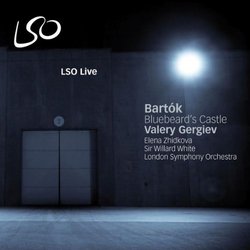A very convincing performance, let down by a generic slavic
Santa Fe Listener | Santa Fe, NM USA | 09/21/2009
(4 out of 5 stars)
"By consensus -- a rare consensus in musical fandom -- the classic version of Bluebeard's Castle was directed by Istvan Kertesz more than forty years ago. His orchestra was the London Symphony. Did that figure into this new LSO Live issue? Gergiev is as stellar on the podium as Kertesz, so it's no surprise that his touch with the orchestral score is stunning. His approach is less overtly exciting and charismatic than Kertesz's; Gergiev leads us into a more haunted place, shadowy where the older recording was luscious, apprehensive from the first moment where the earlier one developed its anxiety more slowly. Rhythms and climaxes aren't as spectacular. But both versions provide exceptional music-making.
After a brief spoken prologue, fittingly given to Bluebeard himself, in which he poses the question, "Does the drama take place inside or outside?" we move seamlessly into the LSO's gorgeous playing. Bass Willard White makes for an older Duke than Walter Berry for Kertesz, and his Hungarian sounds stiff and syllabic, but White is a commanding vocal presence who owns the role. If only his Judith, Elena Zhidkova, didn't possess such a squally slavic soprano when it''s under pressure. For vocal gleam she's nowhere close to Christa Ludwig in the earlier recording. There's dramatic intensity, but it's undercut by generic vocalism, and compared to Ludwig's portrayal Zhidkova is one-dimensional. She doesn't suggest Judith's innocence at the beginning or her desperation at the end. (Gergiev runs the most important opera company in Russia, but why has he completely avoided singers outside the Kirov in all his LSO recordings to date? The London press haven't complained, so far as I know, but they have a right to.)
I've heard complaints about the sonics on previous releases form LSO Live, but this CD is clear, detailed, and enjoyable in its sound, with the singers closely miked. Details like the xylophone and various modernist touches in Bartok's scoring are nicely emphasized. The acoustic dryness of Barbican Hall doesn't seem in evidence. In short, I'd like to welcome this Bluebeard wholeheartedly, but one casting lapse makes all the difference in a two-character opera."
A GAME OF TWO HALVES
Klingsor Tristan | Suffolk | 10/20/2009
(4 out of 5 stars)
"What a curious performance of Bartok's opera this is. In football parlance, very much `a game of two halves'.
For the first half hour or so it seems a very workaday run-through. Too many things are botched or skated over. The prologue (in English and delivered by Bluebeard himself - why?) misses the point in the score where Bartok instructs us to have four bars of the lower strings before the words, `The music sounds'. The wonderful brightening changes of key for Judith's first utterances don't arrest us as they should. The insistent motif in lower strings as the door to the outside world closes is just four-square. The first stabs of the minor seconds of the blood motif as Judith notices the castle walls weeping go for nothing. The dreadful groan from the castle itself - `a cavernous sighing as when the night wind sighs down endless, gloomy labyrinths' - sounds like a couple of turns on the wind machine (Decca with Kertesz got this sound right). I could go on. Even the rich blaze of the view of Bluebeard's domain is underwhelming. Only some beautifully judged rubato from the 1st clarinet as Judith tries to coax Bluebeard into opening the first door brings blessed relief - he plays beautifully throughout, by the way.
Then, suddenly, it all changes. I can even tell you precisely where it happens. The rising theme on the cellos just before Judith demands the last two keys (6 bars after Fig. 84 if you want it exactly) is infused with a new warmth that has been lacking before. The scene with the lake of tears is heart-stopping. Gergiev's heart seems finally to be fully engaged. He gives the pauses after each rippling phrase their full weight and the silences seem as potent as the music. Willard White is swept up in this new engagement and his repetitions of `Tears, Judith, tears (konec, Judit, konec)' are filled with a tragic intensity. And so it goes on to the end of the opera. The woodwind wheedle memorably with Judith as she presses for the final key. The accelerando up to the point where he finally and resignedly gives her the key drives forward with real urgency. Bluebeard's hymn to his previous (and current) wives and the great orchestral climax after it are heart-breaking. The organ in pianissimo as the castle darkens again is far more effective than it was in full splendour supporting the `musica di scena' brass as the door to the domain opens. The music of the last few bars, reprising the opening, has a real orchestral darkness now.
The singers are both well cast. Willard White is a true bass (and takes some of the low options to good effect), but he has real ring and power in the many higher lying lines. Elena Zhidkova has the true Slavic sound that is absolutely demanded for this piece. But they both only really come alive when Gergiev wakes up. White is truly tragic as he faces up to his dark lonely future. Zhidkova achieves the purity of timbre in the later stages that was perhaps missing at the beginning and in the silences between the brass outbursts of the fifth door.
It's puzzling to know how to give a star-rating to this performance. For the first half it merits, at best, three stars. The latter half, though, is well worth 5-stars. I guess you must make your own mind up."

